Results of Survey No. 1: Why choose expatriation in 2024
Expat Communication, experts in cross-cultural intelligence and support for international mobility, unveil the outcome of the Barometer 2024 first survey, carried out online with over 2800 expatriates, from January 30th to February 22th.
To mark its 10th anniversary, the Expat Communication Barometer focuses on the expatriation adventure on a global perspective, to understand each stage of the process and analyse all aspects of mobility today.
This first survey explores people’s motivations and preparations for expatriation, and compares them with their experience once they have arrived. It also examines the reasons for refusing an expatriation. The survey places particular emphasis on the situation and feelings of expatriate women.
To get an insight into the results, see our brief overview below
The expat mood is improving: expatriates are happy with their choice to live and work abroad.
This indicator shows a slight rise in the expatriate mood (71%, +3points vs February 2023). To be noted though: this data does show significant differences depending on gender, activity or expatriation context.
Men-Woman Comparison
Though the gap between men and women has reduced compared to Feb 2023 (Women 70%, 3 points less than men, versus 6 points a year ago), it still points out a more precarious situation for expatriated women.
- Women are overrepresented in segments where work and financial security are more fragile (such as following partner, expatriates without a work contract in the host country, free-lancers)
- Only 64% of women work while for men, it is 75%. Survey results prove that paid activity has a positive impact on global mood.
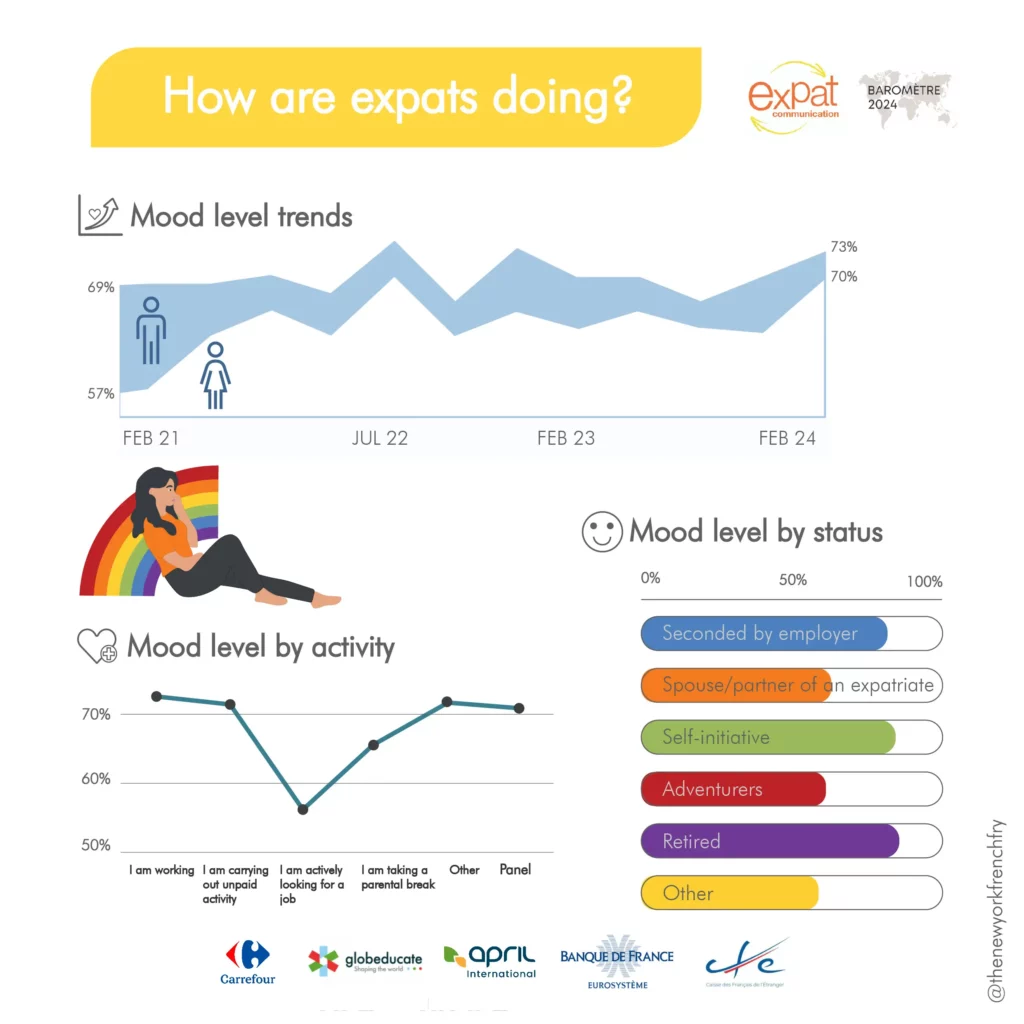
Triggers for leaving on expatriation: the human adventure and life quality
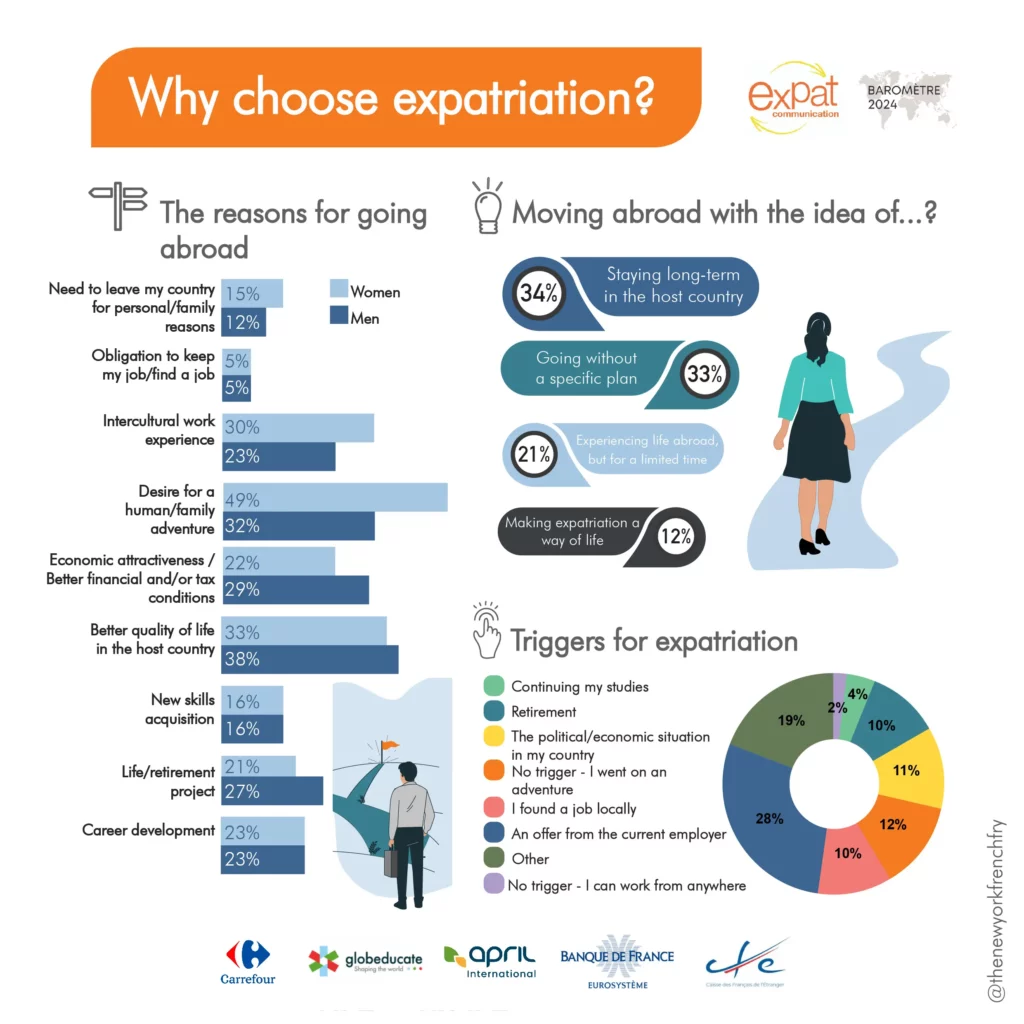
The trend seen in 2023 is continuing, with personal reasons far outstripping professional reasons for moving abroad, even though the main reason for moving abroad is still a proposal from an employer (29%).
Women are more likely to leave for “a human, family or cultural adventure” (49%), while men are more likely to be looking for “a better quality of life” (38%).
The idea of “a life or retirement project” and the “economic, financial or tax appeal” of certain destinations also feature strongly. Unsurprisingly, expatriation is envisaged by two-thirds of respondents over a long period or without any predefined plan.
Only 20% of respondents say that they are leaving with the intention of spending less than five years abroad.
A certain carefree attitude at the outset, only to be overtaken by reality once they're there
The majority of respondents did not identify any obstacles to their departure (56%), and most did not receive any support in preparing for their expatriation (76% of women and 70% of men).
Before leaving, the two biggest sources of stress are accommodation and moving house.
Once there, however, expatriates recognise that the lack of preparation for expatriation, language and intercultural differences, and difficulties in finding a job for their spouse are the three major obstacles to integration in the host country.
Women, in particular, feel that assistance with property, matrimonial, tax, pension and health issues is essential at the start of expatriation, ahead of help in finding accommodation and language courses.
This is in line with the fact that the “expatriation packages” offered by companies only cover the spouse’s pension contribution in 7% of cases. Finally, the discrepancy between expectations and reality in terms of health cover/access to healthcare abroad is strongly emphasised.
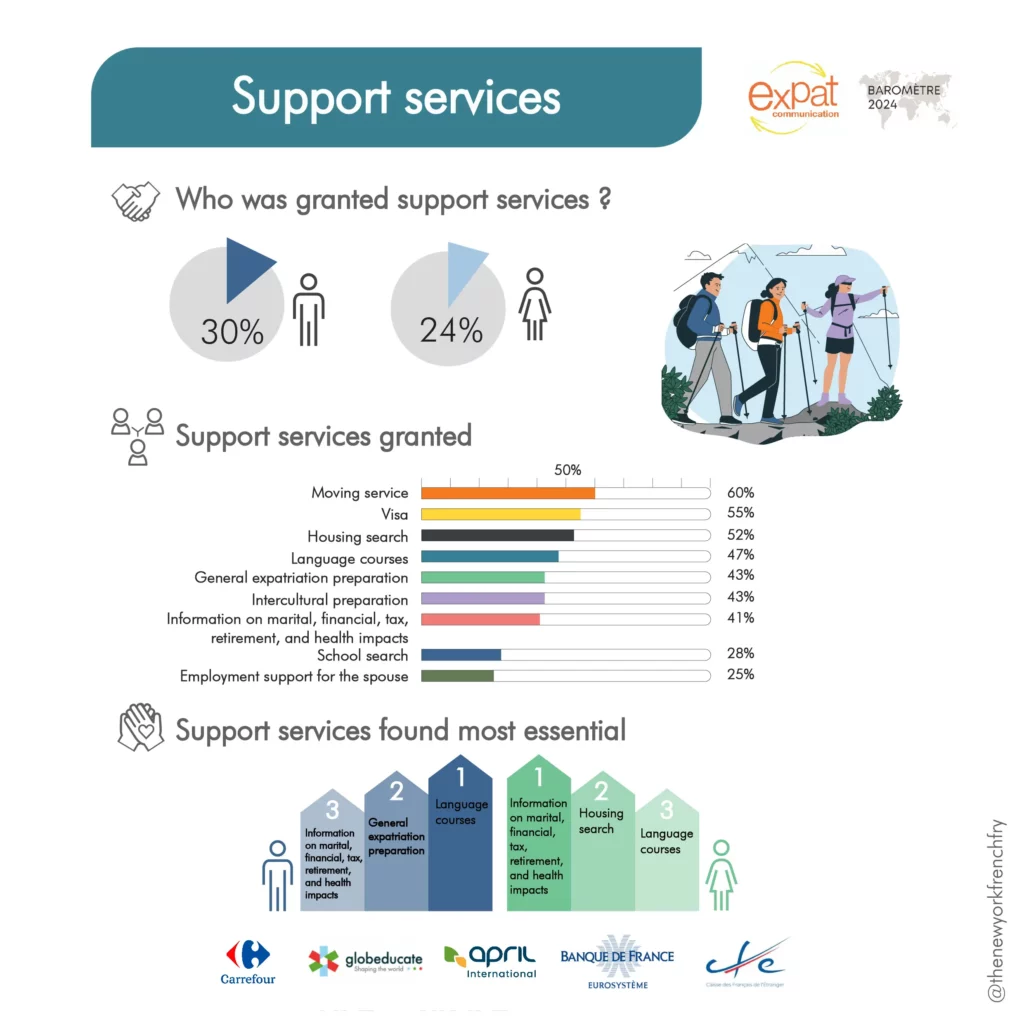
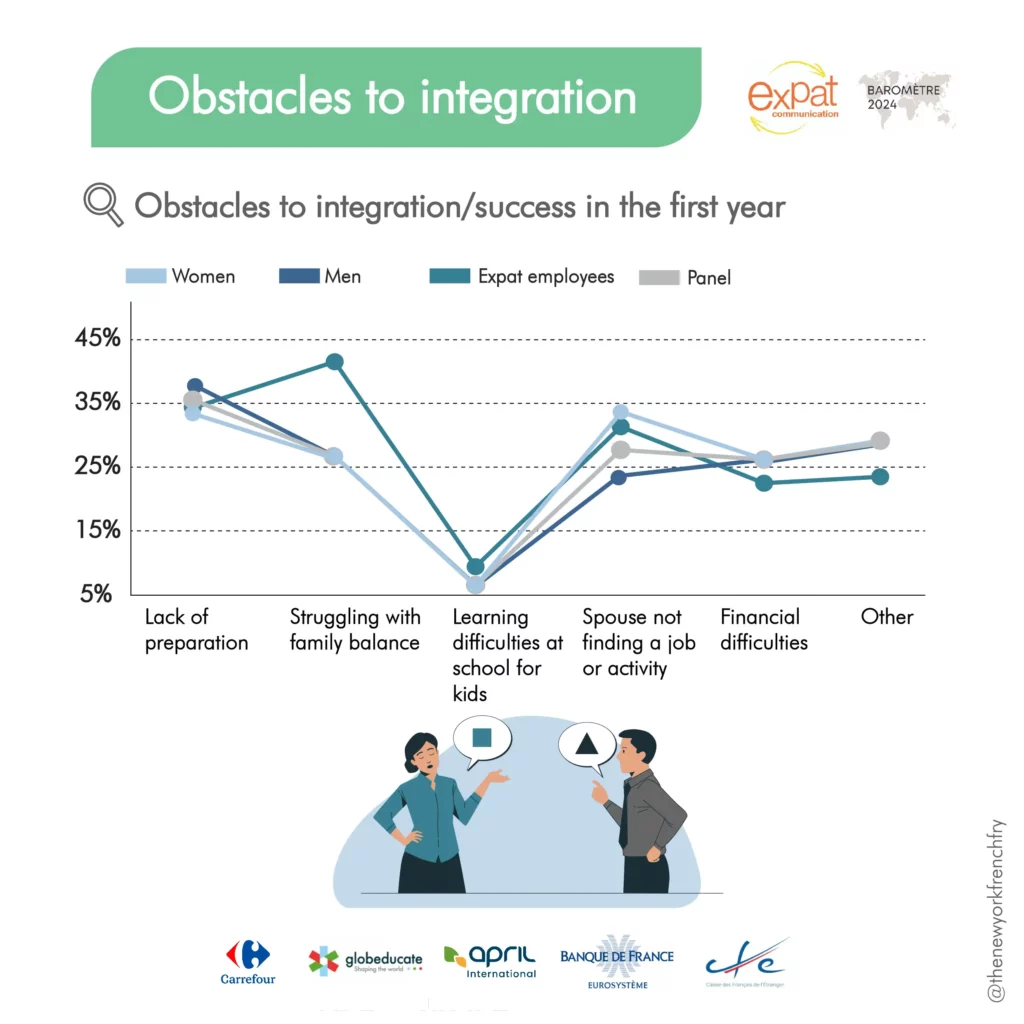
Refusal to expatriate
20% of respondents and 29% of spouses or employees transferred/seconded by their company have already refused an expatriation.
In addition to the political instability of the host country, insufficient financial conditions, particularly from the point of view of women, explain these refusals. It’s also worth noting that women are 2.5 times more likely than men to refuse a move because of ageing parents.
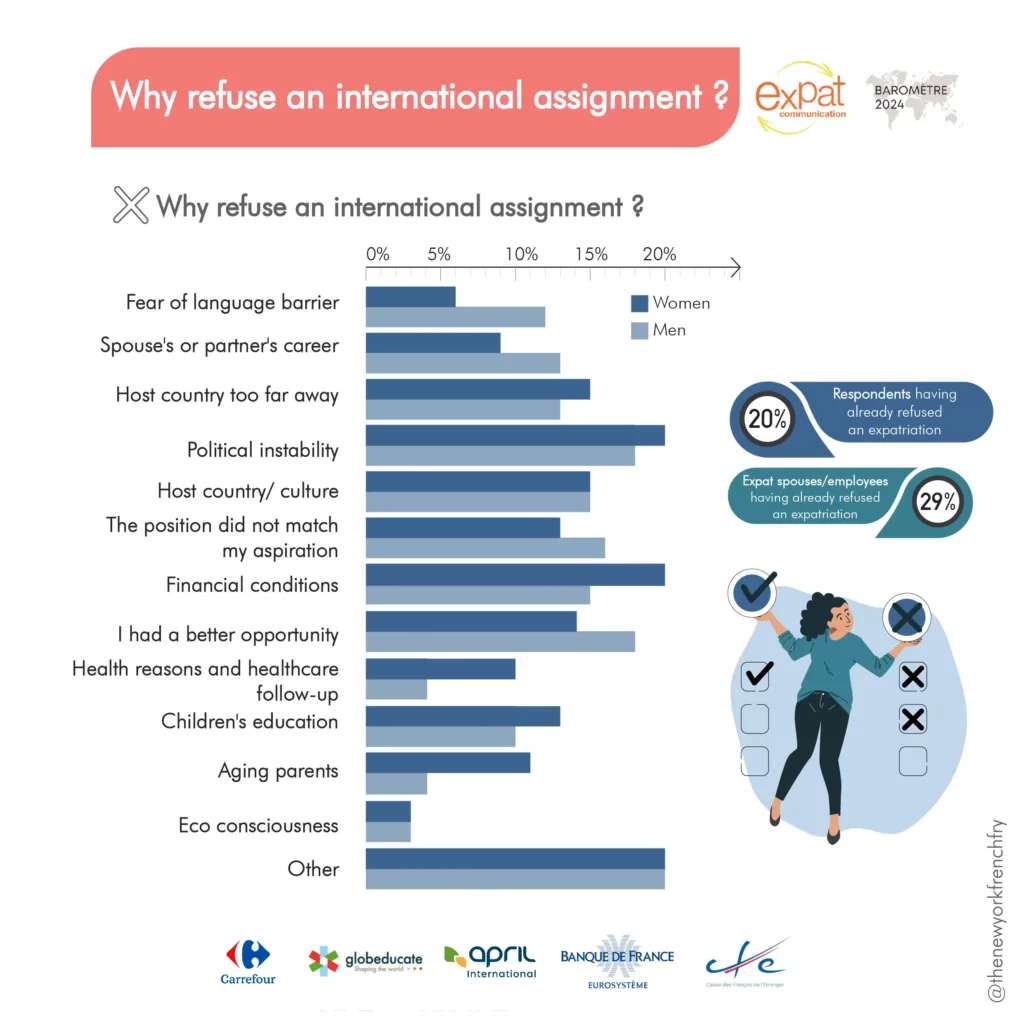
Members of the Expat Communication Barometer.













Those who relay the Expat Communication Barometer.
Next survey on “What you learn on expatriation” from 16 April to 06 May
About Expat Communication
Since 2001, Expat Communication has been preparing and supporting its clients’ expatriates and international teams.
Its mission: to identify and share the keys to a successful international experience through three business lines:
- Expat Lab: benchmark studies on expatriates and international mobility. Barometer, conferences, masterclasses and publications.
- Coaching and training: programmes to facilitate expatriation and strengthen employees’ intercultural intelligence, all over the world in 8 languages. These programmes are run by a network of trained and supervised intercultural coaches.
- Expat Network: Club Expat Premium and the femmexpat.com website support more than 40,000 expatriates worldwide.
Join our panel
If you would like to have access to the infographics and survey results, join the Barometer Board or contact us via the link below for more information:
Contact:

Catherine Talec
Expat Lab Manager
catherine.talec@expatcommunication.com

Alix Carnot
Director, Expat Communication
alix.carnot@expatcommunication.com
On the same topic:

The tour of expatriation in 2024

The faces of expatriation in 2023 – Excellence and vulnerability

Baromètre Expat Communication 2023 : White paper

The impact of expatriation on daily life – results of survey n°3 Barometer Expat Communication 2023

Career and Expatriation: Expat Communication 2023 Barometer, results survey N°2








